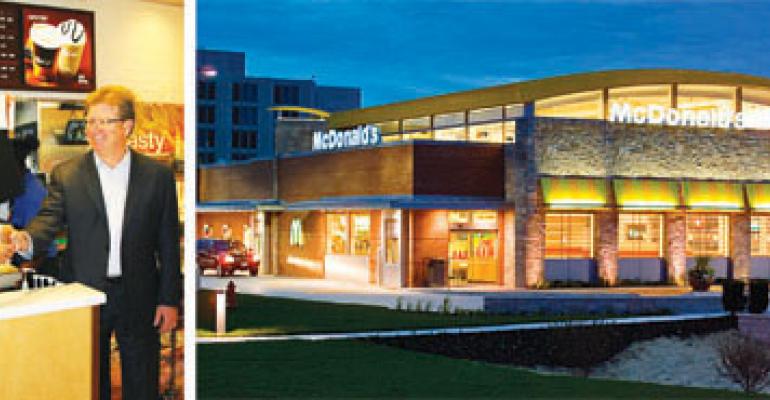McDonald’s Corp. is working a winning plan through its system of owner-operators, says Beaverton, Ore., franchisee Don Armstrong.
The world’s largest hamburger chain, with more than 32,000 restaurants in 100 countries, posted a 4-percent profit increase in the first quarter of 2009. Global same-store sales were up 4.3 percent, and domestic same-store sales rose 4.7 percent. The strong showing at a time when many operators are cutting back, closing units and laying off employees is a result of McDonald’s Plan to Win, Armstrong says.
Plan to Win was launched in 2003, long before the failures of Wall Street financial institutions, stock market crashes and government bailouts. With its emphasis on five P’s—People, Product, Place, Price and Promotion—the strategy has helped the Oak Brook, Ill.-based company stay focused on its mission to offer value and convenience to its customers, Armstrong says. Customers have responded favorably to the restaurants’ offerings of value-priced, midpriced and premium-priced products. The company said earlier that two U.S. sales-driving initiatives—the rollout of the McCafe specialty coffees and the long-tested Angus Third Pounder burger—will be completed systemwide this year.
The Plan to Win also demonstrates the corporation’s desire to listen to its franchisees, says Armstrong, a 30-year owner-operator whose company, UTB Enterprises LLC, has 14 McDonald’s locations.
Armstrong is chairman of the National Leadership Council, a group of 37 McDonald’s franchisees elected by their peers. They are charged with representing the more than 2,400 franchisees who own and operate more than 11,000 McDonald’s restaurants in the United States.
Why did you become a franchisee?
For no explainable reason. I just knew with absolute certainty I wanted to own a store. I was a crew person who had become a manager at a very young age. I worked for an owner-operator on the West Coast here. Ten years into that, I got an opportunity through a special program McDonald’s has that afforded me a modest amount of capital to become an operator of a restaurant in Hermiston, Ore. That was in 1979.
What does UTB stand for?
Unleash the Beagle. It’s from a book my wife discovered [Free the Beagle by Roy H. Williams]. It’s a parable about success in life—about focusing on the things you can do and want to do, and not on the things you can’t do. It’s about looking at life in a way that approaches obstacles as opportunities. The book stuck with me.
BONUS POINTS “McDonald’s has spent the past year advertising value and old favorites from its menu—a move that catered to consumers’ desire for low-risk, familiar products at a good value and helped retain sales momentum through a difficult economy.”—David Palmer, analyst, UBS Securities LLC, New York
The current recession is a big obstacle. How do franchisees turn it into an opportunity?
One of the things that [is] beneficial to us is the strength of the McDonald’s system. We have a great plan. We have great operations. It’s a strong franchisor.
How does McDonald’s help you?
The genius of [McDonald’s founder] Ray Kroc [was that he] knew that franchisees are face-to-face with customers every day. We’re listening to each other and listening to our customers and developing a plan together that is meeting those needs.
The Dollar Menu and value meals are in response to customer needs?
Value really began with our basic proposition. We have value within our base menu, and then the Dollar Menu was about responding to our consumer in terms of their need for outrageous value.
We went through a cycle where we tried to drive transaction through deep discounting. It was a short-term strategy. The long-term strategy is about creating a predictable, everyday opportunity for folks and offering the food choices they want whatever the occasion, whether eating alone or with family.”— [email protected]




